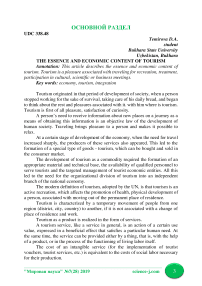The essence and economic content of tourism
Автор: Temirova D.A.
Журнал: Мировая наука @science-j
Рубрика: Основной раздел
Статья в выпуске: 7 (28), 2019 года.
Бесплатный доступ
This article describes the essence and economic content of tourism. Tourism is a pleasure associated with traveling for recreation, treatment, participation in cultural, scientific or business meetings.
Economy, tourism, integration
Короткий адрес: https://sciup.org/140264837
IDR: 140264837 | УДК: 338.48
Текст научной статьи The essence and economic content of tourism
Tourism originated in that period of development of society, when a person stopped working for the sake of survival, taking care of his daily bread, and began to think about the rest and pleasures associated with it. with him where is tourism. Tourism is first of all pleasure, satisfaction of curiosity.
A person’s need to receive information about new places on a journey as a means of obtaining this information is an objective law of the development of human society. Traveling brings pleasure to a person and makes it possible to relax.
At a certain stage of development of the economy, when the need for travel increased sharply, the producers of these services also appeared. This led to the formation of a special type of goods - tourism, which can be bought and sold in the consumer market.
The development of tourism as a commodity required the formation of an appropriate material and technical base, the availability of qualified personnel to serve tourists and the targeted management of tourist economic entities. All this led to the need for the organizational division of tourism into an independent branch of the national economy.
The modern definition of tourism, adopted by the UN, is that tourism is an active recreation, which affects the promotion of health, physical development of a person, associated with moving out of the permanent place of residence.
Tourism is characterized by a temporary movement of people from one region (district, city, country) to another, if it is not associated with a change of place of residence and work.
Tourism as a product is realized in the form of services.
A tourism service, like a service in general, is an action of a certain use value, expressed in a beneficial effect that satisfies a particular human need. At the same time, the service can be provided either by a thing, that is, with the help of a product, or in the process of the functioning of living labor itself.
The cost of an intangible service (for the implementation of tourist vouchers, tourist services, etc.) is equivalent to the costs of social labor necessary for their production.

Tour - a complex of services for accommodation, transportation, catering for tourists, excursion services, as well as guide services and other services provided depending on the purpose of the trip.
In addition to services, tourists can buy tourist goods. The combination of services and goods of tourist destination forms the concept of "tourist product".
Under current law, the tourist product - the right to tour, intended for the implementation of the tourist.
Tourist product includes:
-
- tours, united by purposefulness (cognitive, wellness, etc.);
-
- tourist and excursion services of various types (accommodation, food, transportation, etc.);
-
- tourist-souvenir goods (cards, postcards, souvenirs, books, tourist equipment, etc.).
The economic efficiency of the functioning of tourism is largely determined by the classification of its forms.
The classification of forms of tourism should be understood as their grouping according to uniform features, depending on certain practical goals.
Each form of tourism is characterized by the peculiarity of the needs of tourists and involves a corresponding set of services that satisfy these needs.
In the production and service process of tourism, there are:
-
- forms of tourism;
-
- types of tourism;
-
- types of forms of tourism.
The form of tourism is associated with the crossing by the tourist of the state border of his country, that is, the basis of the division of tourism into forms is a country attribute. On this basis, there are two forms of tourism: domestic and international.
Domestic tourism is domestic tourism, operating within its own country.
The International Tourism Conference, organized by the World Tourism Organization and held in Manila (Philippines) from September 27 to October 10, 1980, was devoted to the definition of domestic tourism, officially proposed by the representatives of India. Some countries establish their definition of domestic tourism.
The Commission for National Tourism Resources defines the domestic tourist as a person who leaves his place of permanent residence in order to visit a place located no closer than 50 miles (80.48 km) from the place of residence.
Domestic tourism can have various professional goals: entertainment, day trips, a trip to the place of work, etc. For a local tourist there is no need to stay at the destination for more than 24 hours, that is, he can either stay overnight at the destination, or return home to that same day.
Russian legislation defines domestic tourism as “traveling within the Russian Federation to persons permanently residing in the Russian Federation”.

International tourism is tourism to another country, that is, foreign tourism. In other words, international tourism means trips with tourist purposes outside the country of permanent residence, more precisely: international tourism is a travel system that is carried out on the basis of interstate treaties.
International tourism is inbound and outbound.
Inbound tourism is travel within the Russian Federation of persons not permanently residing in the Russian Federation.
Outbound tourism is the travel of persons permanently residing in the Russian Federation to another country.
International tourism plays an important role in world economic relations.
In the context of the scientific and technological revolution, the ongoing development of international economic integration, the further deepening of the international division of labor, the growth of cultural, scientific, sports and other interstate contacts, the desire of peoples to communicate and use the experience of other countries in creating material and spiritual values, international tourism is reflected in business and scientific contacts. The turnover of international tourism is in third place in the world after the trade in oil and oil products and the export of cars. International tourism along with other types of economic, cultural, social, scientific and technical relations of states is an important factor in strengthening mutual trust and makes a significant contribution to solving problems such as maintaining peace and strengthening friendly relations between states.
Tourism is a phenomenon of interdependent and historically evolving process of combining national and international factors. Tourist exchanges act as a form and means of international relations and are a necessary element of the activities of public organizations.
International tourism is developing under the influence of many factors that can be combined into three groups: demographic, economic, social.
Economic factors are associated with the development of the world economy, in which there is a steady trend towards an increase in the production of services as compared to the production of goods and, as a result, an increase in the share of consumption of services. Economic factors include the acceleration of scientific and technological progress in all sectors, an increase in the income of the population. The development of the material and technical base of foreign tourism, the creation of new forms of receiving and serving tourists contribute to the intensification of tourist movements.
Reduction of travel time on a certain (permanent) route leads to an increase in the expenditures of a tourist in the share of the transport component, i.e. his transport costs. Depending on the age of tourists, tourism is divided into children, youth and mature.
Depending on the vehicles used for the movement of tourists, the following types of tourism can be distinguished: tourism using the tourist's personal transport and tourism using public transport, that is, transport owned or leased by

the tourist entity. These types of forms of tourism include caravan cruise, sea and river cruises, etc.
According to the form of cooperation, currency and currency exchange by tourist groups can be distinguished. Currency exchange is a mutual travel of tourist groups on the basis of equality of services provided for a certain number of days. Cooperation with partner tourist business entities on a currency basis implies payment for the services provided in the currency agreed by the partners; As a rule, bilateral agreements determine the currency value of one complex service day.
Список литературы The essence and economic content of tourism
- Bogolyubov V.S., Orlovskaya V.P. Economy of tourism. M.: Academy, 2005. - 192 p.
- Robson, P. The Economics of International Integration, 3rd ed., Unwyn-Hyman, London. 1989. -312 p.
- Yakovlev G.A. Economics and statistics of tourism. Tutorial. - M.: Publishing House of the FDPs, 2004. - 376 p.
- http://tourlib.net/ekontur.htm


